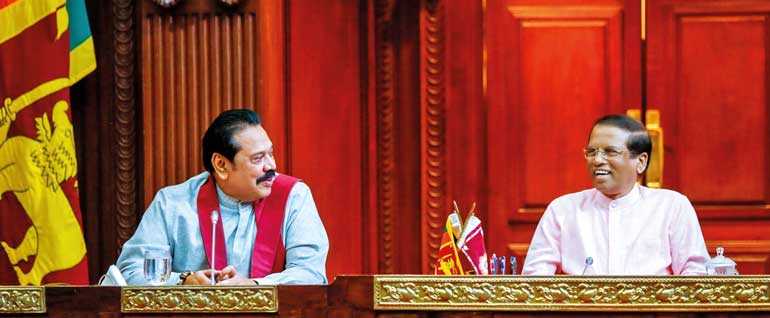Thursday Feb 19, 2026
Thursday Feb 19, 2026
Monday, 29 October 2018 01:34 - - {{hitsCtrl.values.hits}}

President Maithripala Sirisena and newly appointed Prime Minister and former President Mahinda Rajapaksa smile during their Party members’ meeting in Colombo on Saturday - REUTERS.
President Maithripala Sirisena yesterday justified his actions as being in the best interests of the country, arguing that the removal of Ranil Wickremesinghe was done constitutionally and calling for all parliamentarians to support him.
Addressing the nation, Sirisena gave detailed explanations of his actions, recalling his decision to become the common candidate in 2014 and the challenges that he faced over the last three years. He denied that the change on Friday was unconstitutional but did not give an explanation as to why he prorogued Parliament until 16 November.
“Mr. Ranil Wickremesinghe and the UNP complain that the establishment of a new government and appointment of Mr. Mahinda Rajapaksa as Prime Minister were contradictory to the provisions of the Constitution of Sri Lanka. I categorically state that the appointments were made totally in accordance with the Constitution and on the advice of legal experts. No constitutional violation was done when appointments were made and the removal was enacted. With all due respect, I completely reject the charge that what was done was a violation of the Constitution,” he said.
Sirisena also called for the support of all lawmakers, encouraging them to join him to develop the country and put the economy on a better footing. He also said the political crisis had declined since he swore in Rajapaksa.
“I extend an open invitation to all 225 honourable Members of Parliament to join the new government. I do this with the pure intention of taking the country out of the present political crisis and economic problems. Now, the political crisis has somewhat declined. I appeal to everybody to extend the fullest cooperation to the new government formed by me with Mr. Mahinda Rajapaksa as Prime Minister to strengthen democratic governance, freedom of the people, human rights and fundamental rights and media freedom and take our Motherland towards prosperity and make a better and decent society.”
Giving several examples of why he decided to leave the coalition government, Sirisena also touched on recent investigations into allegations of an assassination plot and insisted that the United National Party (UNP) had refused to take the threat seriously.
“There is also the involvement of a Cabinet Minister in this plot to assassinate me. Furthermore, there has been tremendous pressure on investigations. There were instances of some responsible officers of the Attorney General’s Department evading investigation duties. Under these political problems, economic troubles and the strong plot to assassinate me, the only alternative open to me was to invite former president Mahinda Rajapaksa and appoint him as Prime Minister to form a new government.”
Even though he ceded some executive powers, Sirisena noted that Wickremesinghe had not been sufficiently inclusive in his decision-making processes, leading to disagreements between the two and eventually a rift that was unmendable.
“Ranil Wickremesinghe’s political conduct was unbecoming of civilised politics and belittled the victory achieved risking my life in 2015. I believe that Mr. Wickremesinghe and his group of closest friends, who belonged to a privileged class and did not understand the pulse of the people, conducted themselves as if shaping the future of the country was a fun game they played. I feel that Hon. Wickremesinghe grossly violated the very principles of good governance we pledged to uphold.
“Once in the Government, Mr Wickremesinghe arrogantly and stubbornly avoided collective decisions, and tended to take individual decisions. This behaviour led to many conflicts. Due to his lack of collective decision-making through discussion, our country had to face harsh consequences when he used to take decisions with a group of his very close associates. I must state that there was also a policy conflict between Hon. Ranil Wickremesinghe and me during the last three and half years. Apart from policy differences, I noted that there were also differences of culture between Mr. Wickremesinghe and me. I believe that all those differences in policy, culture, personality and conduct aggravated this political and economic crisis.”
The Central Bank bond scam was also mentioned by Sirisena along with details of how he came to appoint a presidential commission of inquiry despite protests from the UNP.
“I wish to reiterate here that Mr. Ranil Wickremesinghe must take responsibility to bring Mr. Arjuna Mahendran to Sri Lanka and produce him before courts. That is because, as everybody knows, Mr. Arjuna Mahendran is a very close friend of Mr. Ranil Wickremesinghe. Local industries of the country were weakened in the last few years and for them to recover, the blessings from the Government alone are not enough.”
He emphasised that there were questionable decisions taken by the UNP and that his efforts to stop these or provide more transparency were not successful. He also charged that it was the UNP which had slowed down corruption investigations and hampered legislative changes that would have improved governance.
“You must have seen in the media about the monetary deal of the EAP company. That company was given to a foreigner. That deal was done fraudulently without calling for tenders. There will be a thorough investigation on this in the near future. Many valuable assets were given to foreigners without tenders. Construction awards were also given without tenders. The emergency Cabinet papers were presented to award such tenders and massive construction awards were given despite objections by the Cabinet.
“One such example is the Kandy Highway Project. Another is the Land Ordinance Special Act, which was presented to Cabinet last week. Then there was the paper on establishing a land bank. I lodged strong protests and postponed those Cabinet papers. The majority of Cabinet Ministers were against these proposals.”